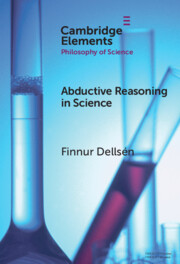Refine search
Actions for selected content:
3 results
Chapter 8 - Harman and Inference to the Best Explanation
-
- Book:
- Compositional Abduction and Scientific Interpretation
- Published online:
- 20 November 2025
- Print publication:
- 04 December 2025, pp 187-201
-
- Chapter
-
- You have access
- Open access
- HTML
- Export citation
Chapter 9 - Lipton and Inference to the Best Explanation
-
- Book:
- Compositional Abduction and Scientific Interpretation
- Published online:
- 20 November 2025
- Print publication:
- 04 December 2025, pp 202-219
-
- Chapter
-
- You have access
- Open access
- HTML
- Export citation

Abductive Reasoning in Science
-
- Published online:
- 03 June 2024
- Print publication:
- 17 October 2024
-
- Element
-
- You have access
- Open access
- HTML
- Export citation
